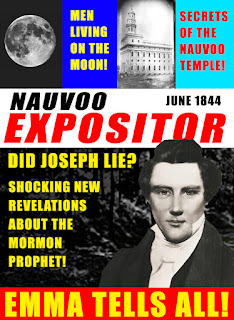The Priesthood in Egypt
Just to give a little background for this, I was asked this question on my mission. It took me a few days to figure out the answer, but I got there eventually. Persistently searching for answers in the scriptures will yield more meaningful results than a Google search. Google offers no challenge, imagination, or faith. It is obviously still a great tool, but you'd be amazed by what you can learn without it. Without further ado, here we go!
If Joseph married an Egyptian how could Ephraim and Manasseh (and by extension their descendants) qualify for the priesthood?
In the Book of Abraham, we learn that the Egyptians in the time of Abraham did not qualify for the priesthood due to Ham's unrighteousness (Abraham 1:25-27). Ham married outside of the covenant and because of that, his posterity lost the opportunity to receive the priesthood. While this may seem unfair, it is not unprecedented (or rather unsubsequented since this happened first. And I know unsubsequented is not a word, but it was the most fun way to convey my idea). For a few centuries, only the sons of Aaron and the Levites could hold the priesthood (more on that later), not to mention the many gentiles lived and died without the priesthood in the time of Christ. Or if you really want to get down to it, how about all those who lived in times of apostasy when nobody had the priesthood at all?
The point is that the priesthood is not always given to everyone. In fact, today's policy of all righteous men holding being able to receive the priesthood is fairly unprecedented (and that time I used it correctly). During the time of Adam, it could be held by his righteous posterity, but Cain lost that right when he murdered his brother and started a secret combination. His posterity was then continued through the line of Egyptus and Ham. His son, Canaan, was the first person in the postdiluvian world to be denied the opportunity to hold the priesthood (Old Testament Student Manual).
This brings us to Joseph and Asenath. Asenath was a woman that Joseph married during his time in Egypt (Genesis 41:45). Together, they had Ephraim and Manasseh. The posterity of these two men would go on to hold the priesthood without any explicit mention of the ban being lifted. The Nephites were mainly descendants of Manasseh and they definitely held the priesthood. So what's the deal? Is this the thread that unravels the sweater of Mormonism?
Nah. Asenath was the daughter of Potipherah, the high priest of On (Genesis 41:45). At this time in history, Egypt was ruled by the Hyksos (BD, Egypt). These people were foreigners who were related to the Hebrews. Their common ancestor was Shem making them Semitic people. Other Semites held the priesthood in the Bible, including Moses' Midianite father-in-law Jethro (D&C 84:6-7). And where were the Hyksos most prominent? Lower Egypt (Wikipedia, Hyksos). The capital of which was On. The city that Asenath was from. What a coincidence!?! Joseph, a Semite who likely knew not to marry outside of the covenant, married a woman from the most Semitic region of Egypt. That's convenient.
"She has an Egyptian name!" I hear the haters shout through my monitor. To be honest, I do not know the etymology of the name, but even if it is one hundred percent Egyptian I think I know the guy that can respond to this concern. His name was Zaphenath-paneah. He is better known throughout the Bible as Joseph. You know, the Semite that married Asenath. So apparently having an Egyptian name does not mean one is an Egyptian because Joseph had one. Pharaoh gave Asenath to Joseph when he gave Joseph his name. It is not too great a leap in logic to say that Pharaoh may have given Asenath her name as well (Genesis 41:45).
Now that the Joseph and Asenath debate has been put to rest, I can briefly address another concern that is tangentially related. Lehi was a descendant of Manessah and not of Levi. How could he have possibly have officiated in the ordinances of the Law of Moses in the wilderness if he was not a Levite?
This one was tricky. But then I remembered D&C 107, "High priests after the order of the Melchizedek Priesthood have a right to officiate in their own standing, under the direction of the presidency, in administering spiritual things, and also in the office of an elder, priest (of the Levitical order), teacher, deacon, and member. a high priest can officiate in any ordinance of the lesser priesthood" (D&C 107:10). So if Lehi was a high priest in the Melchizedek priesthood, he would have been within his rights to perform Levitical sacrifices. We do not know where, when or by whom he was ordained, but doctrinally it would make sense for him to be a high priest.
As always, let me know if you have any questions and feel free to share this along if you found it useful or informative. Also if you have a topic you want me to talk about I am very open to suggestions. I am hoping to get some fun charts out before the end of the year, but I will do my best to address other topics and questions if they arise.




I’ve spent all day reading your blog and I am majorly impressed. This post is cool- I’m glad you know your stuff. Sharing with my family!!
ReplyDeleteThanks for your feedback! I’m glad you like it. I’m taking a brief break this week but I’m planning to be back at it by next week. Let me know if there’s a topic or question you’d like me to tackle.
Delete